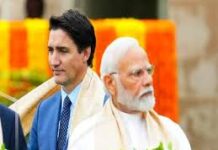China on Monday proposed an inclusive dialogue among all countries in the Indo-Pacific area, following fledgling attempts to form the quad group comprising India, the United States, Australia and Japan.
Rejecting a cold war mindset, Chinese foreign ministry spokesperson Geng Shuang said: “I think all relevant parties can put forward their vision and proposal on how to develop cooperation between the
countries and regions. I hope this kind of proposal and vision can correspond to with the trend and correspond with the trend of the world,” he added.
Officials from the quad–India, Japan, the United States and Australia– have met in Manila on the sidelines of the East Asia Summit, where Prime Minister Narendra Modi, Japanese Prime Minster Shinzo Abe and Chinese Prime Minister Li Keqiang are present.
There is a wide-spread perception in China that the quad effort is primarily aimed at its “containment,” in response to Beijing’s rapid rise.
“The relevant proposal [of forming the Indo-Pacific quad] should be open and inclusive and should be conducive to the win-win cooperation and avoid politicising or excluding some relevant parties,” Mr. Geng observed.
Mr. Geng’s observations were not strikingly different from the language adopted by Ministry of External Affairs in its earlier statement. Referring to the meeting of the officials, the MEA said: “They [the quad officials] agreed that a free, open, prosperous and inclusive Indo-Pacific region serves the long-term interests of all countries in the region and of the world at large.
Mr. Geng highlighted that , “From China’s persistent foreign policy, we welcome the development of friendly cooperation between the relevant countries and we hope this kind of relation is not directed against any third party and we hope this kind of relations will be conducive to the regional peace and stability.”
He added: “Peace, development and win-win cooperation is the trend of the times trend of the world of world. I think the development and any country; any region should correspond to the trend of the time and the trend of the world.”
During a visit to China last week, U.S. President Donald Trump, contrary to the dominant sentiment in his country’s security establishment, rejected the doctrine of “containment” of China, and signaled that Washington and Beijing will be the main pillars of a more inclusive international system.
“The United States working with China and other regional partners have an incredible opportunity to advance the cause of peace, security and prosperity all across the world. It is a very special time and we do indeed have that very special opportunity,” he observed.















